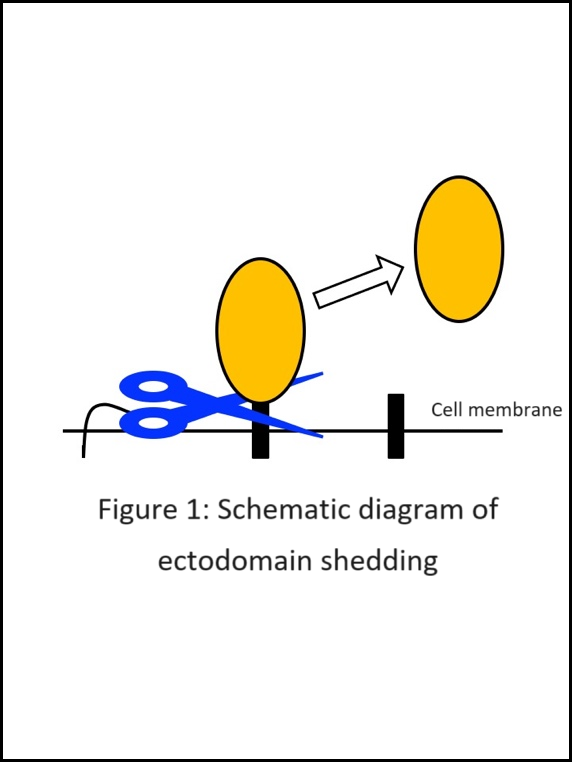To Undergraduate Students

Biological organisms are composed of various organic compounds such as DNA, RNA, proteins, carbohydrates, and lipids. Among them, proteins are the driving force behind vital phenomena. This is made possible by the unique properties of proteins, which dynamically change their activity and localization through "modifications". We are particularly interested in a type of protein modification called "ectodomain shedding(shedding)" (Figure 1), where membrane proteins are cleaved and released from cells. Shedding is a potent modification that not only allows membrane proteins to transmit information over long distances by releasing their extracellular parts but also generates transcription factors that control gene expression in the nucleus by releasing their intracellular parts from the membrane. Shedding is involved in various vital phenomena and has garnered attention for its role in the development of cancer, neurodegenerative diseases, and lifestyle diseases.
Research Topics

1) Mechanisms Determining Shedding of Membrane Proteins
Specific membrane proteins are shed depending on the situation, but the mechanisms determining which membrane proteins are shed remain unclear. We have identified several membrane proteins whose shedding is regulated by alternative splicing (Figure 2). Through the analysis of these membrane proteins, we aim to uncover the mechanisms determining shedding.
2) Mechanisms Enhancing Shedding
Shedding is enhanced in response to certain conditions, but these mechanisms are also not well understood. We will focus on proteins that bind to the shedding protease (scissors in Figure 1) and lipids in the cell membrane to elucidate these mechanisms.
3) Vital Phenomena Regulated by Shedding
The proteins we have identified as being shed play various roles, such as cell proliferation, adhesion, pathogen uptake, and ion concentration regulation. We will analyze how shedding controls these functions and clarify the overall role of shedding.
For Those Interested in Joining Our Lab
In your previous lectures and experiments, you have learned things that already have known answers. However, in your graduation research, you will be expected to uncover important unknowns with your own hands. To achieve this, you will need not only the ability to think and act independently but also the ability to communicate with those around you and build trust. I am confident that through graduation research (and preferably research during the master's program), gaining the sense that "your actions can change society" will be a great asset for your future career. If you are interested, please feel free to contact me at kshira@fc.ritsumei.ac.jp (please replace the full-width @ with a half-width @).
Graduate School of Life Sciences Application Information:
Application Information | RITSUMEIKAN UNIVERSITY Graduate School of Life Sciences
Graduate School of Life Sciences Scholarship Information:
Scholarship | RITSUMEIKAN UNIVERSITY Graduate School of Life Sciences



